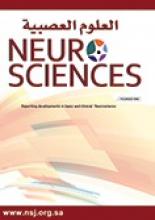Abstract
OBJECTIVE: To determine the use of brain CT as a routine diagnostic tool in patients presenting with syncope.
METHODS: From March 2006 to April 2008, 292 patients presented with a history of transient loss of consciousness to the emergency department at the King Hussein Medical Center, Amman, Jordan. A neurologist examined all investigated patients and brain scans were obtained. Patients were classified into 4 groups according to brain scan findings and their neurological examination.
RESULTS: Out of the 292 patients, 254 (86.9%) patients underwent brain scan, 38 (13%) patients were excluded. The first group included 203 (79.9%) patients, who had normal brain scan, and normal neurological examination. The second group included 10 (3.9%) patients all of which had abnormal brain CT scan findings related to their syncope, and also had abnormal neurological examination. The abnormal neurological findings can be attributed to their syncopal episode and abnormal brain CT findings. Classified into 3 groups based on their brain CT findings and their neurological examination on presentation. The third group included 39 (15.3%) patients who had abnormal brain scan with findings not related to their syncope and either normal or abnormal neurological examination not related and cannot be attributed to the abnormal head CT findings and their syncopal episode. The last group had 2 patients (0.7%) with abnormal scan and normal neurological examination.
CONCLUSION: The use of brain scan as a routine diagnostic tool in patients with syncope is unjustifiable, unless there is an indication in the history or physical examination.
- Copyright: © Neurosciences
Neurosciences is an Open Access journal and articles published are distributed under the terms of the Creative Commons Attribution-NonCommercial License (CC BY-NC). Readers may copy, distribute, and display the work for non-commercial purposes with the proper citation of the original work.






